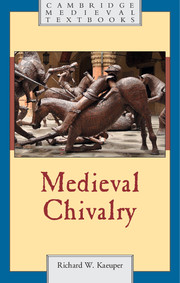Book contents
- Frontmatter
- Dedication
- Contents
- List of figures
- Acknowledgments
- Part I An approach to chivalry: was it real and practical?
- Part II Three broad chronological phases
- Part III The privileged practice of violence
- Part IV Chivalry, governing institutions, and ideals
- 8 Kings and knights
- 9 Chivalry in dialogue with religious ideals
- Part V The world of chivalric emotions
- Reflections
- Select Bibliography
- Index
8 - Kings and knights
from Part IV - Chivalry, governing institutions, and ideals
Published online by Cambridge University Press: 05 August 2016
- Frontmatter
- Dedication
- Contents
- List of figures
- Acknowledgments
- Part I An approach to chivalry: was it real and practical?
- Part II Three broad chronological phases
- Part III The privileged practice of violence
- Part IV Chivalry, governing institutions, and ideals
- 8 Kings and knights
- 9 Chivalry in dialogue with religious ideals
- Part V The world of chivalric emotions
- Reflections
- Select Bibliography
- Index
Summary
CHIVALRY AND THE EMERGING STATE
During the age of chivalry, kings and great lords (and urban communal governing bodies) were busily extending their reach (Figure 9). They expanded administrative structures, increased the flow of legislation, bolstered law enforcement, and increased financial exaction within societies producing new forms and deposits of wealth. The kingdom of Sicily, where Richard Lion-Heart may have seen a draft of the Chanson d'Aspremont (quoted in the introduction to this part) while on crusade, provides a good case in point, as more famously did Richard's own territories on the continent and his kingdom of England with its central royal court, the great administrative gyroscope of the exchequer, itinerant justices on circuit throughout the realm, and emerging methods of taxation that produced appreciable results. The French kingdom under his fellow crusader and bitter rival Philip II (Augustus) provides another case in point with its territorial acquisitions and its administrative advances in justice and finance. Such processes on either side of the Channel generated what Joseph Strayer termed “the medieval origins of the modern state.” And they can be found south of the Pyrenees as well, if on a slightly later chronology. Thirteenth-century Castile witnessed a move toward centralization of political power, especially under Alfonso X (r. 1252–1284). Evidence includes not only the great law book, the Siete Partidas, but also the beginning of the appointment of corregidores – royal officials appointed at the local level to oversee the meting out of justice, some control over the use of armed force, and general oversight of administration. If conditions were more mixed and complex east of the Rhine and north of the Alps, regional governing powers still developed within growing towns and lay and ecclesiastical lordships. It is at least interesting to note that Wolfram von Eschenbach in his Parzifal pictured King Arthur prohibiting his knights from undertaking any joust without his permission.
In short, early working notions of sovereignty – especially evident in the Anglo-Norman and Capetian efforts – did not have to await formal declaration of theory by the French jurist and political philosopher Jean Bodin in the late sixteenth century.
- Type
- Chapter
- Information
- Medieval Chivalry , pp. 239 - 263Publisher: Cambridge University PressPrint publication year: 2016

